19
Questions to Ask Your Pharmacist About Prescription Medications
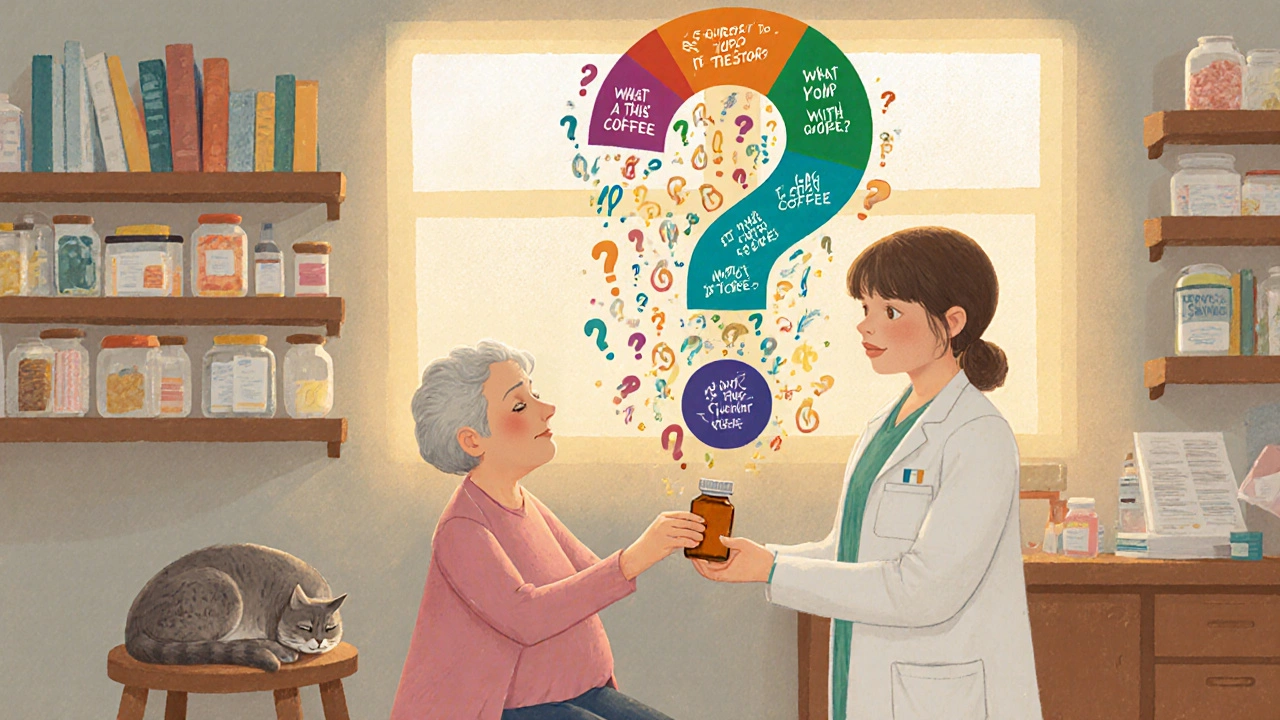
Don’t just pick up your prescription-ask the right questions
You walk into the pharmacy, get your pills, and walk out. But what if you didn’t? What if you took two minutes to ask your pharmacist something simple, like what this medication is actually for? You might avoid a dangerous interaction, save money, or even prevent a hospital visit. Pharmacists are trained to catch mistakes doctors miss. They know how drugs interact, how to spot duplicate prescriptions, and when a cheaper generic will work just as well. Yet most people never ask.
What is this medicine for-and why am I taking it?
One in three medication errors happens because patients don’t understand why they’re taking a drug. You might get a pill for high blood pressure, but if you don’t know it’s meant to protect your kidneys and heart, you might stop taking it when you feel fine. That’s dangerous. Always ask: “What condition is this treating?” and “How will I know it’s working?” If your doctor says “take this for your cholesterol,” your pharmacist can explain what cholesterol does, why it matters, and how this drug lowers it. That understanding makes you more likely to stick with the treatment.
When and how should I take it?
Timing matters more than you think. Some pills need to be taken on an empty stomach. Others work better with food. Some are meant for morning use because they cause drowsiness or keep you awake at night. A 2022 study found that nearly half of patients get dosing wrong-taking a pill at the wrong time, skipping doses, or doubling up out of confusion. Ask: “Should I take this with food or without?” “What time of day is best?” and “Can I take it with my coffee or grapefruit juice?” Grapefruit, for example, can dangerously boost levels of certain blood pressure and cholesterol drugs. Your pharmacist knows these details by heart.
What side effects should I watch for?
Everyone hears about side effects, but most people don’t know which ones are normal and which are emergencies. Ask: “What are the most common side effects?” and “Which ones mean I need to call my doctor right away?” For example, a mild headache from a new blood pressure pill? Common. Swelling in your throat or trouble breathing? That’s an emergency. Some side effects are seasonal too-like increased sun sensitivity in summer. If you’re taking a medication that makes your skin burn easily, your pharmacist can warn you before you get a bad sunburn. And don’t forget to ask: “How can I manage the side effects?” Sometimes, taking the pill with food or switching to a different time of day can cut nausea or dizziness in half.
Could this interact with anything else I’m taking?
This is the most important question you can ask. One in seven hospital admissions is caused by drug interactions that could have been avoided. You’re not just taking your prescription-you’re probably taking vitamins, supplements, painkillers, or herbal teas. A 2023 Reddit thread shared a real case: a man on blood pressure medication was also taking hawthorn berry supplements. His doctor didn’t know. His pharmacist did-and told him to stop immediately. That interaction could have caused his blood pressure to crash. Always bring your full list: prescriptions, over-the-counter meds, vitamins, CBD, turmeric, St. John’s Wort, or anything else. Even “natural” products can interfere. Ask: “Does this interact with anything else I’m using?” And if you’re unsure, ask for a written list of interactions to check later.
What if I miss a dose?
Life happens. You forget. You travel. You’re sick. You skip a pill. But what should you do next? Doubling up? Waiting until tomorrow? Taking it late? The answer changes depending on the drug. For antibiotics, missing a dose can lead to resistant bacteria. For insulin or heart meds, skipping can be life-threatening. Ask: “What should I do if I miss a dose?” and “Is it safe to take it late?” Some pills can be taken up to 12 hours late. Others can’t be doubled. Your pharmacist will give you the exact rule for your specific medication-not a general guess.
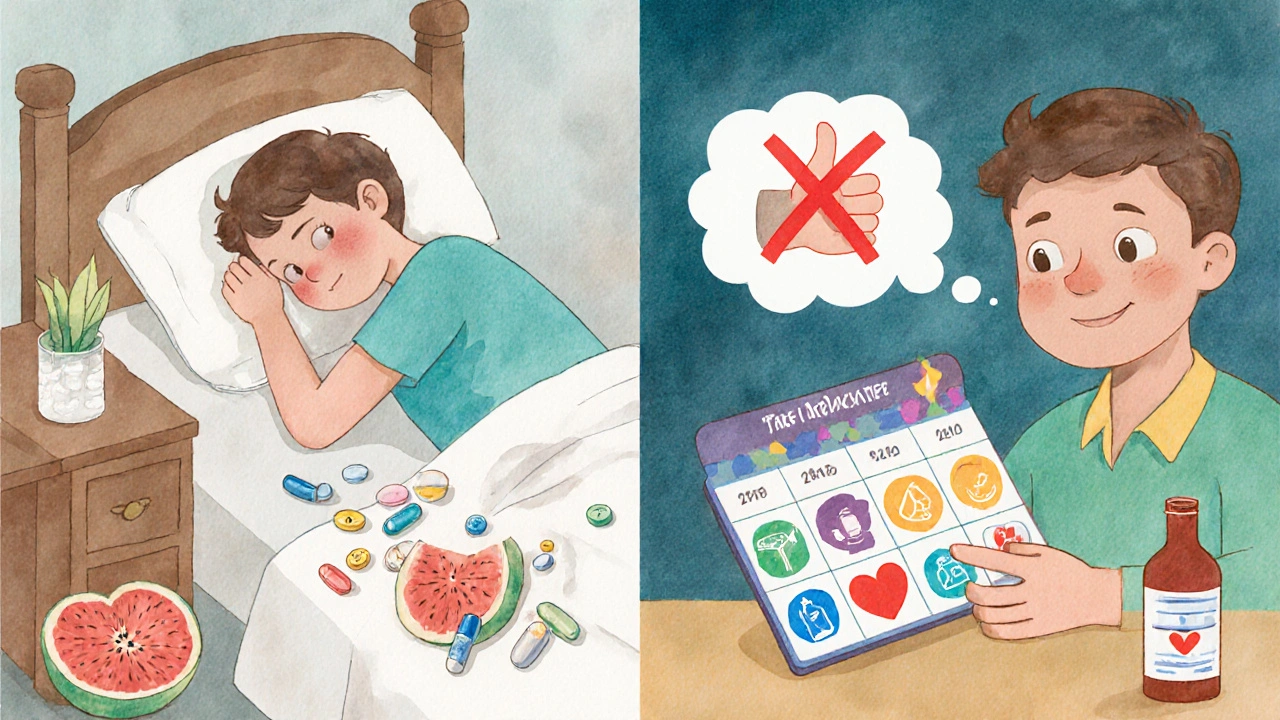
Are there cheaper or generic options?
Brand-name drugs can cost 80% more than generics-and they work the same. The FDA requires generics to match brand-name drugs in strength, safety, and effectiveness. Ask: “Is there a generic version?” If there is, it’s almost always cheaper. But don’t stop there. Ask: “Do you offer a discount program?” Many pharmacies have $4 lists for common medications. Some offer mail-order savings. Others have coupons you didn’t know about. One woman in Sydney saved $1,200 a year just by switching her cholesterol pill to a generic and using her pharmacy’s loyalty program. Ask about alternatives-even if your doctor didn’t mention them.
Do I need tests or check-ups while taking this?
Some medications need monitoring. Blood thinners require regular blood tests. Diabetes drugs need your sugar checked. Kidney or liver function can change with long-term use. Ask: “Will I need blood tests or other checks?” and “How often?” If your doctor didn’t schedule a follow-up, your pharmacist might remind you. And if you’re on a new drug, ask: “When should I expect to feel better?” Some meds take weeks. Others work in hours. If you stop too soon because you didn’t feel results, you might think the drug didn’t work-when it just hadn’t had time.
Are there non-drug ways to manage this condition?
Medications aren’t always the only option. Ask: “Are there lifestyle changes that could help?” For high blood pressure, weight loss and reduced salt intake can lower numbers as much as some pills. For type 2 diabetes, exercise and diet can reduce or even eliminate the need for insulin. For mild depression or anxiety, therapy and sleep habits can be as effective as medication. Your pharmacist can point you to reliable resources-like trusted websites, community programs, or nutrition guides. They’re not just dispensing pills; they’re helping you live better.
How do I store this safely?
Some medications need refrigeration. Others lose potency if exposed to heat or moisture. Keep your insulin cool. Don’t store pills in the bathroom-steam ruins them. Keep opioids and sedatives locked away if kids or visitors are around. Ask: “How should I store this?” and “How long is it good for?” Expired medications can be ineffective-or even harmful. If you’re unsure, bring the bottle in. Your pharmacist can tell you if it’s still safe to use.
What’s the best way to remember to take my pills?
Half of people stop taking chronic meds within a year-not because they feel better, but because they forget. Ask: “What tools can help me remember?” Some pharmacies offer blister packs with days of the week printed on them. Others have phone alerts or apps linked to your prescription. A simple pill organizer can cut missed doses by 60%. If you take five or more pills a day, ask for a medication review. Many pharmacies now offer free monthly check-ins to make sure everything still makes sense together.
Why pharmacist advice matters more than you think
Pharmacists aren’t just the people who hand you the bottle. They’re the last line of defense before you take a pill. They catch duplicate prescriptions, spot dangerous combinations, and spot when a patient is taking too much. A 2021 study found that pharmacist-led interventions reduce hospital visits by 33%. In one case, a pharmacist caught a patient taking two different acid reducers-both with the same active ingredient. Left unchecked, that could have damaged their kidneys. In another, a patient developed serotonin syndrome because they didn’t tell their doctor they were taking St. John’s Wort with tramadol. Both cases were preventable. The difference? One person asked questions. The other didn’t.
How to make the most of your pharmacy visit
Pharmacists are busy. A typical interaction lasts under three minutes. To get the most out of it:
- Bring a list of everything you take: prescriptions, OTC meds, supplements, vitamins, herbal teas.
- Write down your questions before you go. Don’t rely on memory.
- Ask for the “teach-back” method: after they explain, say, “So if I understand right, I take this with water, not food, and stop if I get dizzy?” Then repeat it back. This improves adherence by 40%.
- If you’re overwhelmed, ask: “Can I come back later if I think of more questions?” Most pharmacies will call you back or email you.
- Use the FDA’s free “My Medicine Record” form. It’s online. It’s simple. It’s designed for exactly this.
What if you’re in a rural area or can’t get to the pharmacy?
One in five Americans lives in a place with a pharmacist shortage. If you can’t get there in person, many pharmacies now offer virtual consultations via phone or video. Telepharmacy services are growing fast-62% of rural hospitals now use them. You can still ask all the same questions. You can still get your meds delivered. You can still get safety checks. Don’t assume you’re out of luck. Call your pharmacy and ask: “Do you offer phone or video consultations?”
What’s changing in pharmacy care right now
Pharmacists are gaining more authority. In 45 states, they can now prescribe certain medications-like naloxone to reverse overdoses, or patches for quitting smoking. Some can even adjust doses under doctor supervision. In 2024, the FDA launched a new standard for medication guides: all patient handouts will look the same, making it easier to understand risks and instructions. And by 2025, more pharmacies will offer genetic testing to see how your body processes drugs. That means your next pill might be chosen based on your DNA, not just your symptoms.
Final thought: You’re the most important person in your care
No one else will fight for you like you will. Doctors are busy. Nurses are stretched thin. But your pharmacist? They’re right there, holding your meds in their hands. They want you to be safe. They want you to feel better. But they can’t help if you don’t speak up. Don’t be shy. Don’t assume they know everything. Don’t think your question is too small. Asking three simple questions-What is this for? How do I take it? What should I watch out for?-can change your health outcome. And that’s worth two minutes of your time.
Can pharmacists really help me avoid dangerous drug interactions?
Yes. Pharmacists are trained to spot interactions between prescription drugs, over-the-counter medicines, supplements, and even foods. For example, grapefruit can dangerously increase levels of certain blood pressure and cholesterol drugs. St. John’s Wort can cause serotonin syndrome when mixed with antidepressants. A 2023 study found that pharmacist reviews prevent 1.5 medication errors per patient admission. They’re the last safety check before you take a pill.
Do I need to bring my list of medications to every visit?
Always. Even if you’ve been to the same pharmacy for years. Your meds change. You might start a new supplement. You might stop a painkiller. Your pharmacist needs the full picture. Bring every pill, patch, capsule, and herbal tea. Use the FDA’s free “My Medicine Record” form-it’s designed to help you track everything. Missing one item can lead to a dangerous interaction.
Are generic medications as effective as brand-name ones?
Yes. The FDA requires generics to have the same active ingredient, strength, dosage form, and route of administration as the brand-name version. They must also meet the same strict quality standards. The only differences are in inactive ingredients (like color or filler), which don’t affect how the drug works. Generics cost 80-85% less and work just as well. Always ask if a generic is available.
What should I do if I forget to take my medication?
Don’t guess. Ask your pharmacist. For some drugs, like antibiotics, you can take the missed dose as soon as you remember. For others, like blood thinners or insulin, doubling up can be dangerous. The rule depends on the medication. Your pharmacist will tell you exactly what to do-whether to skip it, take it late, or wait until tomorrow. Never assume.
Can pharmacists help me save money on prescriptions?
Absolutely. Many pharmacies offer discount programs, mail-order savings, or $4 generic lists. Some have coupons not advertised online. Pharmacists can also check if a different dosage (like splitting a higher pill) could save you money. One patient saved $1,200 a year just by switching to a generic and using their pharmacy’s loyalty program. Always ask: “Are there cheaper options?”
Is it safe to take my meds with alcohol?
It depends. For some medications, like antibiotics or sleep aids, alcohol can make side effects worse-drowsiness, dizziness, liver damage. For others, like blood pressure pills, it can cause dangerous drops in blood pressure. Always ask your pharmacist. Don’t rely on internet searches or advice from friends. The interaction is specific to your drug, your dose, and your health.
Can pharmacists give me advice on non-drug treatments?
Yes. Many pharmacists are trained in lifestyle management for conditions like high blood pressure, diabetes, and high cholesterol. They can recommend diet changes, exercise routines, or stress-reduction techniques backed by science. They can also point you to trusted websites, community programs, or local support groups. They’re not just dispensing pills-they’re helping you live better.
What if I don’t understand the instructions on the label?
Ask for clarification. Never guess. If the label says “take once daily,” but you’re not sure if that means morning or night, ask. If it says “take with food,” ask what kind of food. Use the “teach-back” method: repeat the instructions in your own words. If you’re still unsure, ask for a printed handout or a phone call later. Pharmacists are paid to answer your questions.
How often should I have my medications reviewed?
At least once a year-or anytime you start or stop a medication. If you take five or more drugs, ask for a comprehensive medication review. Many pharmacies offer this for free, especially for Medicare patients. The review checks for duplicates, interactions, unnecessary pills, and outdated prescriptions. It can save your life.
Can pharmacists help me if I’m having trouble affording my meds?
Yes. Many pharmacies have patient assistance programs, manufacturer coupons, or discount cards. Pharmacists know which drug companies offer free or low-cost options for low-income patients. They can also suggest switching to a generic, splitting pills (if safe), or using mail-order services. Never stop taking a drug because you can’t afford it-ask your pharmacist for help first.
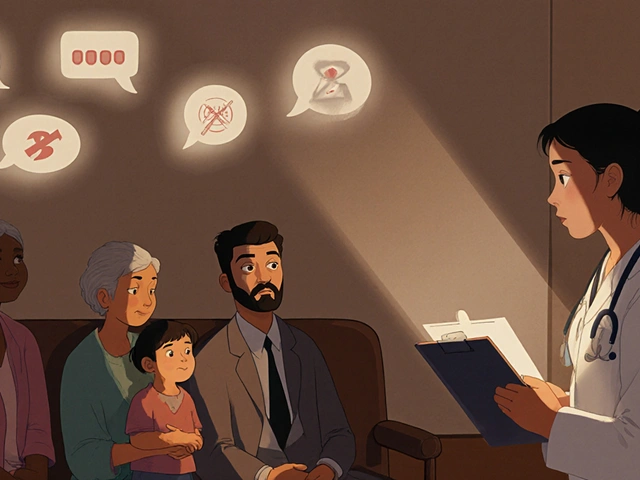

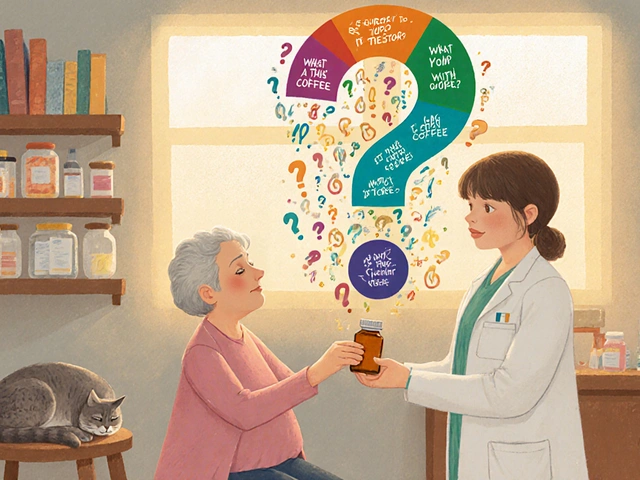
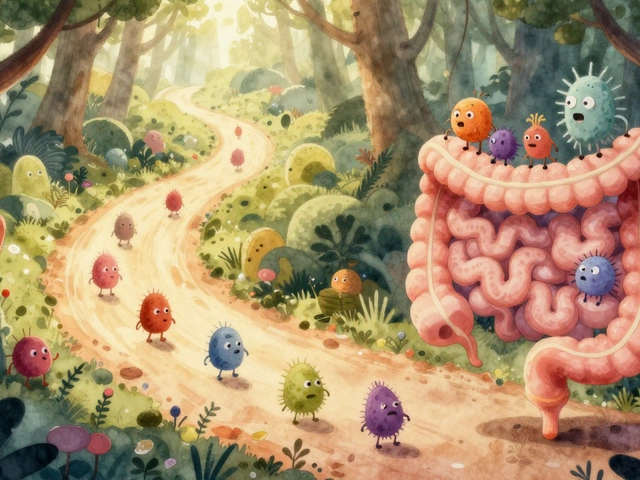
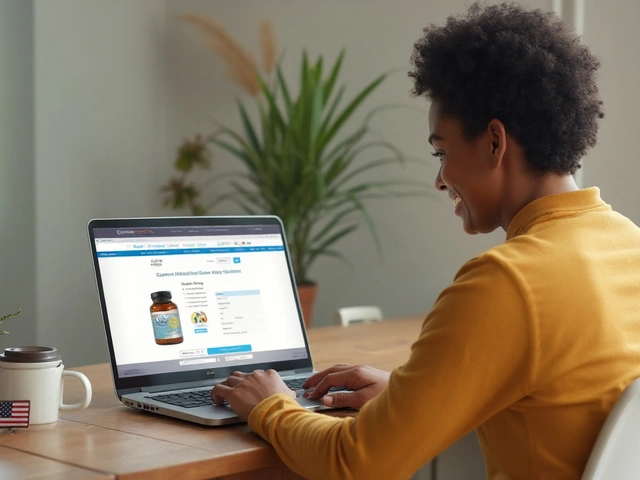





Nicole Ziegler
November 19, 2025 AT 22:14Bharat Alasandi
November 21, 2025 AT 06:16Kristi Bennardo
November 21, 2025 AT 15:40Shiv Karan Singh
November 22, 2025 AT 13:52Ravi boy
November 23, 2025 AT 12:56Matthew Peters
November 24, 2025 AT 09:02Jeremy Samuel
November 25, 2025 AT 02:52Destiny Annamaria
November 26, 2025 AT 05:17Alyssa Torres
November 27, 2025 AT 17:02Summer Joy
November 29, 2025 AT 02:04Aruna Urban Planner
November 29, 2025 AT 09:14Matthew Karrs
December 1, 2025 AT 06:53Liam Strachan
December 2, 2025 AT 22:47